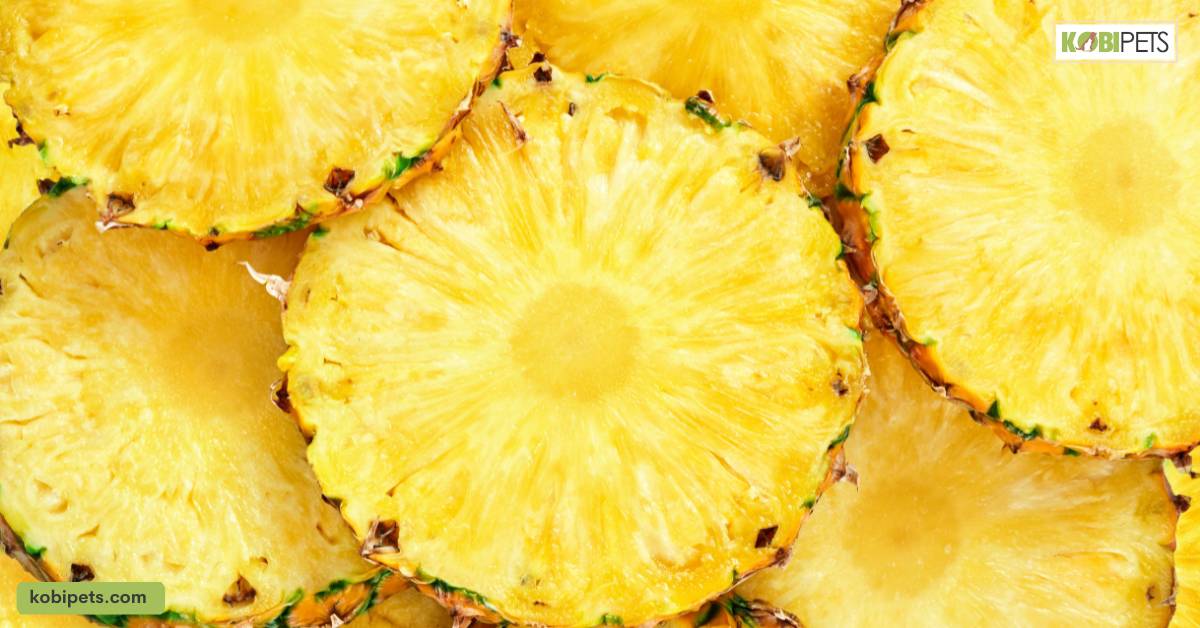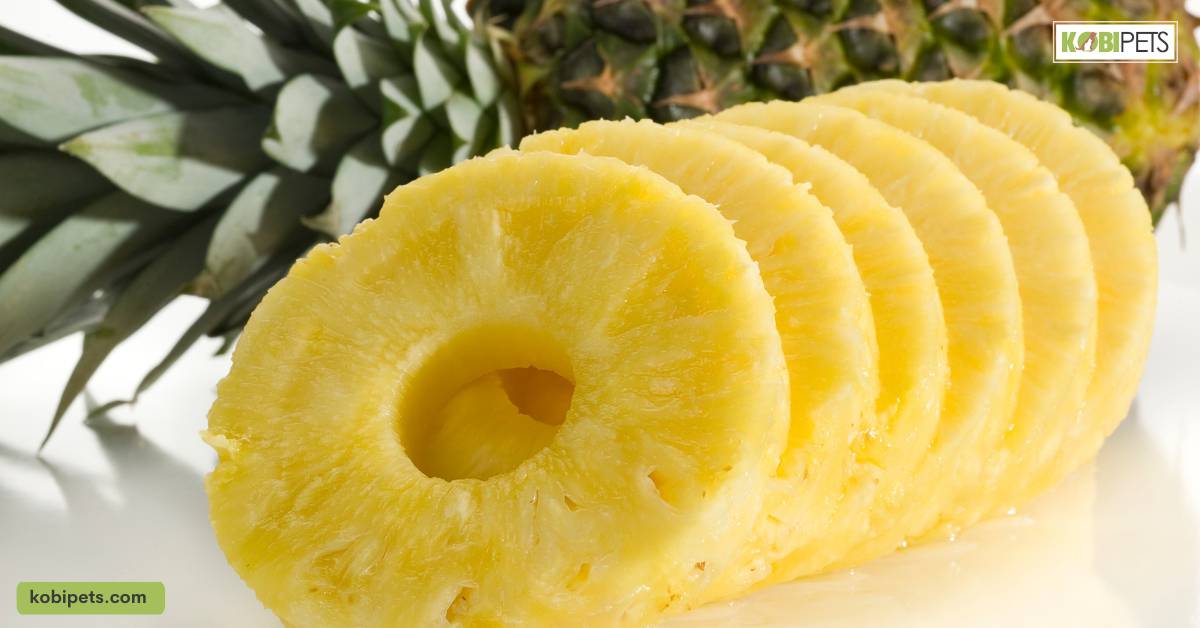Isn’t it amazing how our furry friends seem to be interested in every bite of food we take? If you’re a fan of the tropical, tangy sweetness of pineapple, you may have wondered if it’s safe to share a bite or two with your canine companion.
Yes, dogs can eat pineapple in moderation as it is rich in vitamins and fiber and provides health benefits. However, always remove the skin and core before giving it to your dog and monitor for any allergies. Canned pineapple should be avoided due to added sugars and preservatives.
Can Dogs Eat Pineapple?
Absolutely, dogs can enjoy pineapple in moderation. This tropical fruit is rich in vitamins C and B6, thiamin, and fiber, providing essential nutrients for your furry friend. From boosting their immune system to aiding digestion, pineapple offers numerous health benefits.
However, remember to introduce it into their diet gradually and always serve it in small, manageable chunks to prevent any choking hazard. Also, like any treat, pineapple should not constitute more than 10% of your dog’s daily caloric intake to maintain a balanced diet.
Always monitor your dog after introducing any new food to ensure they do not have any adverse reactions.
Is It Safe For Dogs To Eat Pineapple?
Yes, pineapple is generally safe for dogs to eat. However, there are a few key points to keep in mind to ensure your dog can enjoy this sweet treat without any negative effects:
- Proper Portion Size: Just like with any treat, moderation is key. Too much pineapple can lead to an upset stomach, diarrhea, or an unhealthy increase in sugar consumption.
- Remove the Core and Skin: The hardcore and rough skin of the pineapple isn’t easily digestible and can be a choking hazard. Always remove these parts before giving pineapple to your dog.
- Monitor for Allergies: While rare, dogs can be allergic to pineapple. Symptoms of an allergic reaction include itching, redness, and difficulty breathing. If you notice any of these signs, stop feeding pineapple to your dog immediately and consult your vet.
- Avoid Canned Pineapple: Always opt for fresh pineapple over canned. Canned pineapple usually contains added sugars and preservatives, which aren’t good for your dog’s health.
What To Consider Before Feeding Your Dog Pineapple
Before you start slicing up that juicy pineapple for your furry friend, there are a few key points you should consider. Just like any other “human food”, it’s important to ensure that pineapple is given in a way that is safe and beneficial for your pup.
Before feeding your dog pineapple, consider these factors:
Your Dog’s Health Condition
Not every dog’s system can comfortably handle pineapple, especially dogs with diabetes due to the high sugar content. If your dog has any chronic health conditions, always consult with your vet before introducing new foods into their diet.
Your Dog’s Dietary Habits
Does your dog have a history of overeating or food aggression? If so, introducing a new, tasty treat like pineapple could potentially exacerbate these issues. Always introduce new foods gradually and observe your dog’s behavior.
Pineapple as a Training Reward
If your dog likes the taste of pineapple, small pieces can be an effective, healthy reward during training sessions. However, remember to factor in these treats when considering your dog’s overall daily caloric intake.
The Quality of the Pineapple
Always opt for fresh, ripe pineapples. Avoid unripe ones as they can cause throat irritation in dogs. Also, never feed your dog spoiled or moldy pineapple, as it can lead to food poisoning.
Can Dogs Eat Pink Pineapple?
Yes, dogs can eat pink pineapple, which is a genetically modified version of the traditional yellow fruit. It is safe and shares the same nutritional benefits as the regular pineapple.
However, it’s always essential to remember moderation and preparation rules. Only offer small pieces, remove the skin and core, and monitor for any allergic reactions or changes in behavior.
Consult your vet if your dog has specific dietary requirements or health conditions.
Can Dogs Eat Dried Pineapple?
Yes, dogs can eat dried pineapple, but it should be given sparingly. Dried pineapple, like other dried fruits, usually has a higher sugar concentration than its fresh counterpart, potentially leading to increased calorie intake and weight gain.
Furthermore, some commercial dried pineapple products may contain added sugars, preservatives, or other artificial ingredients that are not recommended for dogs. Always check the packaging to make sure that the dried pineapple you are serving your pet is as natural as possible — the only ingredient should be pineapple.
However, dried pineapple can have its benefits. It is packed with dietary fiber and can be a good source of vitamins and minerals that can contribute to your dog’s overall health. The chewy texture of dried pineapple can also serve as a fun, enjoyable treat for your dog.
Can Dogs Eat Canned Pineapple?
While canned pineapple isn’t toxic to dogs, it’s not the best option for them to consume. Canned varieties often contain added sugars and preservatives that aren’t beneficial for your pet’s health.
Additionally, the syrup in canned pineapple significantly elevates the fruit’s natural sugar content, potentially leading to unhealthy weight gain or other health issues.
If you’re considering feeding your dog pineapple, it’s best to stick to fresh, raw chunks in moderation.
Does Your Dog Eat Things They Shouldn’t?
It’s not uncommon for dogs to eat things they shouldn’t — from shoes to trash and even harmful foods. If your pup has a habit of getting into things they shouldn’t, pineapple can actually serve as a deterrent in some cases:
Pineapple as a Deterrent
Some dog owners have found that feeding their dogs small amounts of pineapple can stop them from eating their own feces, a behavior known as coprophagia. The theory behind this is that pineapple gives the feces a strong, unpleasant taste.
However, this method doesn’t work for all dogs and should not replace proper training and supervision.
Introducing New Foods
If your dog is prone to getting into things they shouldn’t, be extra cautious when introducing new foods like pineapple. Monitor their behavior and reaction to the new food closely, and if any issues arise, consult your vet.
Training and Supervision
Training is crucial for teaching your dog what is and isn’t acceptable to eat. Supervision, especially when they’re in an area with many temptations, can help prevent them from eating things they shouldn’t.
Safe Spaces
Creating a safe environment for your dog can prevent them from eating harmful objects. This includes securing trash cans, keeping food out of reach, and providing them with plenty of dog-safe toys to keep them occupied.
Is Pineapple Bad For Dogs?
While pineapples aren’t inherently bad for dogs, like any food, they can have negative effects if consumed in excess or improperly prepared. Overeating pineapple can lead to stomach upset, diarrhea, or high sugar intake, which isn’t ideal for dogs, especially those prone to obesity or diabetes.
Pineapple’s acidic nature could also cause mouth sores in some sensitive dogs. Furthermore, the hardcore and rough skin can pose a choking hazard or cause digestive obstruction if ingested.
Therefore, it’s crucial to serve pineapple in small, manageable portions, removing the skin and core, and always observing your dog for any changes in behavior or adverse reactions.
Parts Of The Pineapple My Dog Should Not Eat
Absolutely, there are certain parts of a pineapple that your dog should avoid:

Parts Of The Pineapple My Dog Should Not Eat
- Pineapple Skin/Rind: The tough, outer layer of a pineapple, known as the skin or rind, is not suitable for dogs. It can be hard to digest, potentially leading to gastrointestinal issues, and can also pose a choking risk.
- Pineapple Core: While the core of a pineapple isn’t toxic to dogs, its tough texture makes it difficult to chew and digest. Feeding your dog the core may result in choking or gastrointestinal obstruction.
- Pineapple Leaves: Pineapple leaves are spiky and tough – not something your dog should be munching on. They can cause injury to the mouth and throat, and if swallowed, can lead to serious digestive issues.
- Unripe Pineapple: An unripe pineapple can be harsh on a dog’s stomach and cause throat irritation. Always ensure the pineapple you’re feeding your dog is ripe and fresh.
- Spoiled Pineapple: If a pineapple is moldy or spoiled, it’s not safe for your dog to consume. Consuming spoiled food can lead to food poisoning symptoms such as vomiting, diarrhea, and loss of appetite.
How Much Pineapple Can Dogs Have?
As with any treat or addition to your dog’s diet, moderation is key when feeding them pineapple. The general rule is that treats, including fruits like pineapple, should not make up more than 10% of your dog’s daily caloric intake.
This ensures that they maintain a balanced diet. Since each dog varies in size, breed, and energy level, it’s best to consult your vet for personalized guidance. Always serve pineapple in small, manageable chunks, and keep a close eye on your dog to monitor for any signs of discomfort or adverse reactions.
In conclusion
Feeding your dog pineapple can be a wonderful addition to their diet, offering a range of health benefits thanks to its rich nutrient profile. Like with any food item, it’s essential to keep moderation in mind and ensure that it’s prepared correctly by removing the skin, core, and leaves.
Always monitor your dog’s reaction to new food items, and consult your vet if you have any questions or concerns.





















